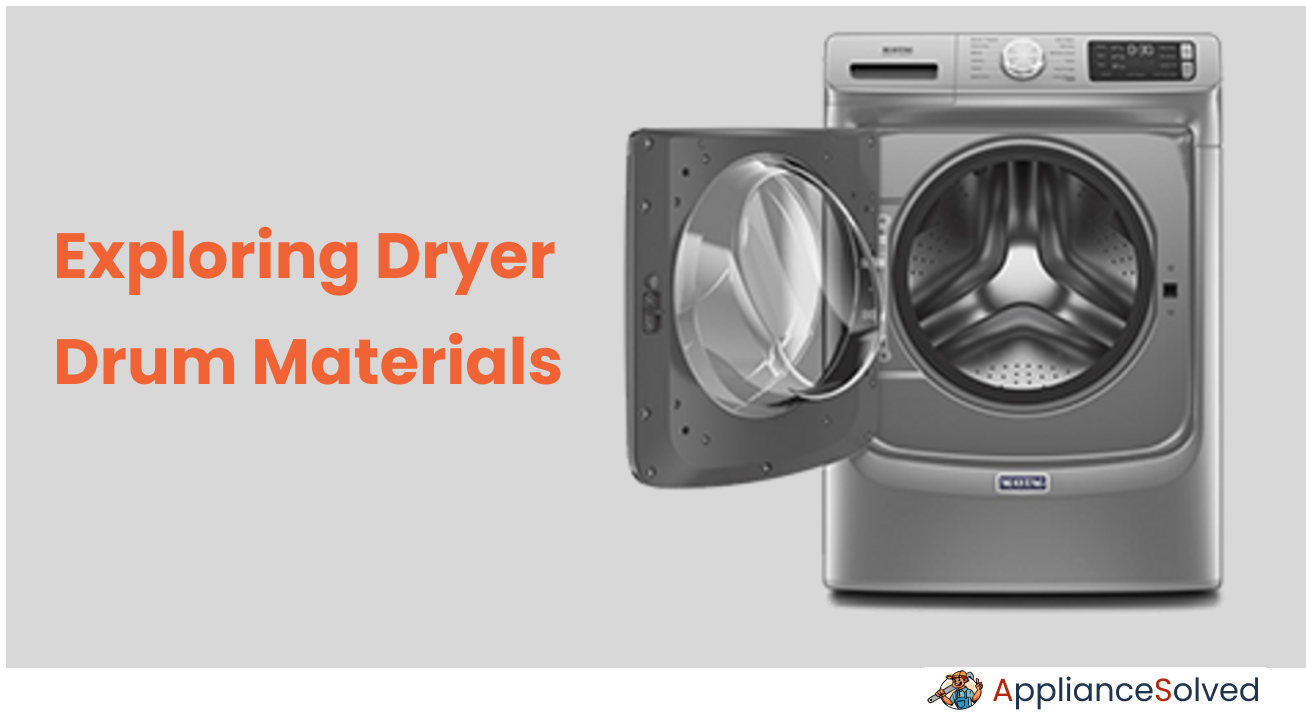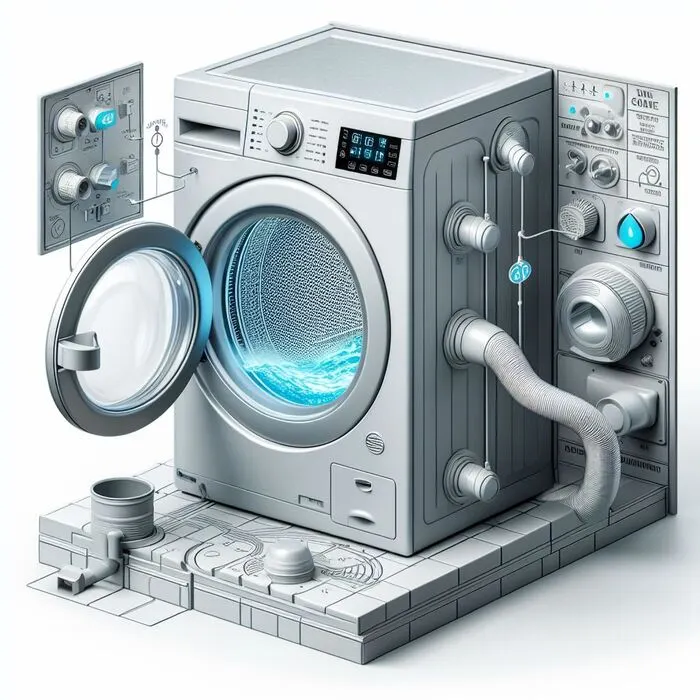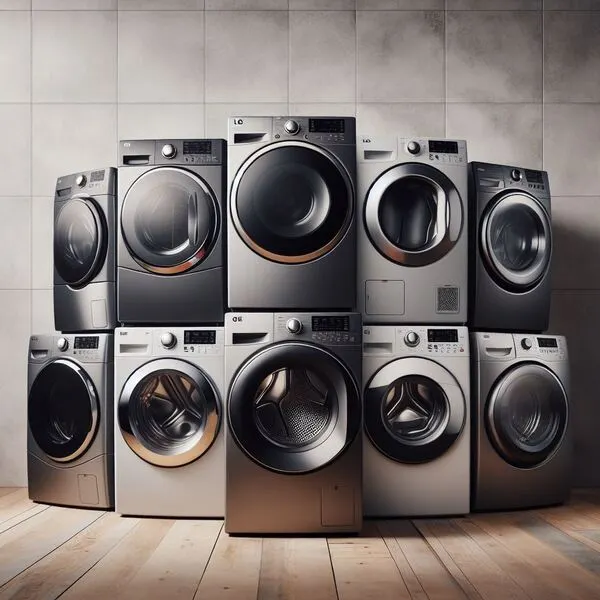Exploring Dryer Drum Materials: A Comprehensive Guide
When it comes to laundry appliances, the unsung hero is often the dryer drum. This unassuming dryer part plays a crucial role in the drying process, affecting everything from drying efficiency to fabric care. In this comprehensive guide, we delve into the world of dryer drum materials, examining their impact on performance and longevity. Discover how choosing the right dryer drum material can lead to optimal drying results and a longer-lasting appliance.
What is the Dryer Drum?
The term “dryer drum” refers to a crucial component found in laundry appliances, specifically in clothes dryers. It is a cylindrical chamber within the dryer where clothes are placed for drying. The drum rotates as the drying cycle progresses, facilitating the circulation of warm air through the clothes, the dryer motor primary function is to power the rotation of the drum. This warm air aids in the evaporation of moisture from the fabrics, effectively drying them. The design and material of the dryer drum play a significant role in determining the efficiency of the drying process, as well as factors such as fabric care and overall drying performance.

What is the Role of the Dryer Drum?
This cylindrical chamber acts as a vessel for your clothes during the drying cycle. As the drum rotates, warm air circulates through the clothes, evaporating moisture and leaving them dry. The choice of drum material significantly influences how effectively this process occurs.
What are the Types of Dryer Drum Materials?
The types of dryer drum materials are:
- Stainless Steel
- Zinc Drum (Galvanized Steel)
- Coated Drums (Porcelain-Coated Steel)
- Plastic Drums
- Aluminized Alloy
What is the Stainless Steel Drum?

A “stainless steel drum” is a type of drum used in clothes dryers, specifically made from stainless steel material.
What is the Stainless Steel?
Stainless steel is a type of alloy renowned for its exceptional durability and resistance to corrosion. It is composed primarily of iron, along with chromium and other elements, which contribute to its unique properties. In the context of dryer drums, stainless steel is a widely utilized material due to its numerous advantages.
What makes stainless steel a top choice for dryer drum materials?
Stainless steel stands as a stalwart option due to its exceptional corrosion resistance and longevity. This material remains unyielding against the rigors of damp environments, ensuring your dryer drum remains rust-free. Furthermore, its smooth surface prevents fabric snags, while its ability to repel stains and odors ensures your laundry comes out fresh.
What is the Zinc Drum (Galvanized Steel)?
A “zinc drum,” specifically referred to as a “galvanized steel drum,” is a type of drum commonly used in clothes dryers. In this context, a galvanized steel drum is crafted from steel that has undergone a galvanization process. During galvanization, the steel is coated with a layer of zinc, creating a protective barrier against corrosion and rust.
What is the Zinc (Galvanized Steel)?
Zinc, specifically in the context of “galvanized steel,” refers to a type of steel that has undergone a process known as galvanization. Galvanized steel is steel that has been coated with a layer of zinc, creating a protective barrier against corrosion and rust.
How does galvanized steel fare as a dryer drum material?
Galvanized steel, or zinc-coated steel, offers an attractive balance between affordability and rust resistance. Through the galvanization process, a layer of zinc is applied to the steel surface, creating a barrier against corrosion. However, it’s important to note that this material may be susceptible to chipping over time, potentially compromising its longevity.
What is the Coated Drums (Porcelain-Coated Steel)?
A “coated drum,” specifically referring to a “porcelain-coated steel drum,” is a type of drum commonly used in clothes dryers. In this context, a coated drum is crafted from steel that has been coated with a layer of porcelain. This coating creates a smooth and durable surface within the dryer drum.
What is the Coated (Porcelain-Coated Steel)?
“Coated (Porcelain-Coated Steel)” refers to a specific type of material used in constructing dryer drums, where the drum is made from steel that has been coated with a layer of porcelain. This coating process involves applying a thin layer of porcelain enamel to the surface of the steel drum and then heating it at high temperatures to fuse the porcelain to the steel, creating a smooth and durable finish.
How does porcelain-coated steel contribute to effective drying?
Porcelain-coated steel drums boast a smooth, chip-resistant surface that’s gentle on fabrics. This smoothness translates to reduced wear and tear on your laundry. While it maintains affordability and durability, there’s a caveat to consider: chipping can expose the underlying steel to potential rust, so vigilant maintenance is key.
What is the Plastic Drums?
“Plastic drums” refer to a specific type of drum used in clothes dryers, where the drum is constructed from plastic material. In the context of dryer drums
What is the Plastic?
“Plastic” refers to a synthetic material that is created through the manipulation of various polymers. It is a versatile substance known for its malleability, durability, and wide range of applications in numerous industries. Plastic is produced by chemically combining different elements to form long chains of molecules, resulting in a material that can be molded into various shapes and sizes.
How do plastic drums cater to fabric care?
Plastic drums offer a lightweight alternative with a gentle touch on fabrics. They’re less likely to cause abrasion compared to harder materials. Additionally, their cost-effectiveness and quieter operation make them an attractive choice. However, concerns arise regarding their long-term durability and potential impact on drying efficiency.
What is the Aluminized Alloy Drum?
An “Aluminized Alloy Drum” refers to a specific type of drum used in clothes dryers, constructed from an aluminized alloy material.
What is the Aluminized Alloy?
“Aluminized alloy” refers to a type of material that is created by applying a layer of aluminum-silicon alloy onto a base substrate, often made of steel. This combination of materials results in a material that incorporates the beneficial properties of both aluminum and steel.
What distinguishes aluminized alloy as a dryer drum material?
Aluminized alloy, a steel coated with a layer of aluminum-silicon alloy, boasts impressive heat resistance and affordability. This makes it an attractive option for efficient drying. Nevertheless, potential drawbacks include discoloration over time and susceptibility to rust in areas where the coating may wear thin.
What are the Factors Influencing Material Choice?
Fabric Care: Which Material is Kindest to Fabrics?
The choice of drum material significantly affects fabric wear and tear. Smooth surfaces, like stainless steel and coated drums, reduce the risk of snags and fabric damage. Opting for a material that respects the delicacy of your fabrics can lead to longer-lasting clothes.
Energy Efficiency: Which Material Boosts Drying Efficiency?
Drum materials play a pivotal role in heat distribution and drying time. Materials that effectively retain and radiate heat can lead to quicker drying cycles. Investing in the right drum material can save both time and energy in the long run.
Noise Levels: Which Material Provides Quieter Operation?
Drum materials contribute to the noise levels during the drying cycle. Materials like stainless steel, with their inherent noise-dampening properties, lead to quieter operation. For those concerned about a peaceful laundry experience, the drum material choice matters.
Maintenance and Cleaning: Which Material Requires Less Upkeep?
Drum materials vary in terms of ease of cleaning and maintenance. Some materials, such as porcelain-coated steel, are less likely to retain lint and require minimal upkeep. Choosing a material aligned with your maintenance preferences can simplify your laundry routine.
Making the Right Choice
Considering Your Laundry Habits: Which Material Suits You Best?
Your laundry habits and priorities should drive your drum material choice. Delicate fabrics may benefit from smoother surfaces, while heavy loads could benefit from materials that distribute heat efficiently. Considering factors like energy efficiency, fabric care, and noise levels helps you make an informed decision.
Maintenance Tips for Prolonging Dryer Drum Lifespan
General and Material-Specific Maintenance Practices
Regular maintenance ensures your dryer drum operates optimally, regardless of the material. Simple steps like regular cleaning, avoiding overloading, and checking for loose items can prevent potential issues. Additionally, specific care routines, such as stainless steel polishing and rust prevention for galvanized steel, cater to each material’s unique needs.
Comparing Different Drum Materials
To aid your decision-making process, here’s a quick comparison of the pros and cons of each drum material:
| Drum Material | Pros | Cons |
|---|---|---|
| Stainless Steel | Corrosion resistance, longevity, fabric-friendly | Higher cost, potential noise |
| Zinc (Galvanized) | Affordability, rust resistance | Chipping, potential limited lifespan |
| Coated (Porcelain) | Smooth surface, fabric care, durability | Susceptibility to chipping and rust |
| Plastic | Lightweight, gentle on fabrics, cost-effective | Long-term durability concerns, potential efficiency impact |
| Aluminized Alloy | Heat resistance, affordability | Discoloration over time, susceptibility to rust |
Aluminized Alloy vs Stainless Steel Dryer Drum: Comparing Features and Benefits
When choosing a dryer drum material, the decision often boils down to two popular options: aluminized alloy and stainless steel. Both materials offer unique qualities that cater to specific needs. Let’s delve into a comparison of these materials to help you make an informed choice for your dryer.
Aluminized Alloy Dryer Drum:
Heat Resistance: Aluminized alloy excels in its ability to withstand high temperatures without warping, making it an excellent choice for effective heat distribution during drying cycles.
Affordability: Aluminized alloy drums often offer cost advantages compared to premium materials like stainless steel, making them a budget-friendly option.
Corrosion Resistance: The aluminum-silicon alloy coating enhances resistance to corrosion and rust, ensuring durability even in moisture-prone environments.
Discoloration: Over time, aluminized alloy may experience discoloration due to high temperatures, though this doesn’t necessarily impact performance.
Rust Resistance: While aluminized alloy offers corrosion resistance, it might not match the rust resistance of stainless steel in the long term.
Stainless Steel Dryer Drum:
Corrosion Resistance: Stainless steel is renowned for its exceptional resistance to corrosion and rust, ensuring a longer lifespan and improved durability.
Fabric Care: The smooth surface of stainless steel minimizes fabric wear and tear, reducing the risk of clothes snagging during the drying cycle.
Longevity: Stainless steel’s durability and longevity make it a long-term investment, potentially outlasting other materials like aluminized alloy.
Heat Distribution: Stainless steel effectively distributes heat, contributing to efficient and consistent drying cycles.
Noise Reduction: Stainless steel’s inherent noise-dampening properties lead to quieter operation during drying, enhancing the overall laundry experience.
Investment: While stainless steel drums come at a higher initial cost, their extended lifespan and benefits can justify the investment over time.
In the aluminized alloy vs stainless steel dryer drum debate, each material has its strengths. Aluminized alloy offers cost-effectiveness, heat resistance, and corrosion resistance, making it a solid choice for efficient drying. On the other hand, stainless steel shines with its superior corrosion resistance, fabric care benefits, and overall longevity. While the initial cost of stainless steel might be higher, its durability and enhanced features often make it the preferred option for those seeking a premium, reliable, and long-lasting dryer drum material.
Ultimately, your choice should align with your priorities, usage patterns, and the specific advantages that resonate with your laundry needs. Whether you opt for the heat resistance of aluminized alloy or the robustness of stainless steel, both materials contribute to a more effective and efficient drying process.
FAQ Dryer Drum Material
What is the dryer drum made of?
Dryer drums are typically made from various materials, including stainless steel, aluminized alloy, porcelain-coated steel, and plastic. The choice of material can impact factors like durability, fabric care, and drying efficiency.
Which is better, aluminized alloy or stainless steel dryer drum material?
The choice between aluminized alloy and stainless steel for a dryer drum material depends on your priorities. Stainless steel offers superior corrosion resistance, fabric care, and longevity. Aluminized alloy, while more affordable, provides good heat resistance and corrosion resistance, but may not match stainless steel’s overall durability.
Is aluminized alloy dryer drum good?
An aluminized alloy dryer drum offers advantages like cost-effectiveness, heat resistance, and corrosion resistance. However, its longevity and rust resistance might not be as robust as stainless steel. Consider your preferences and needs when evaluating the suitability of aluminized alloy for your dryer drum.
What are Samsung dryer drums made of?
Samsung dryer drums are typically made from stainless steel, a material known for its corrosion resistance, fabric-friendly surface, and durability. This choice contributes to the performance and longevity of Samsung dryers.
What is drum hardware made of?
Drum hardware, referring to the metal components that hold a drum kit together, is commonly made from durable materials like steel or aluminum. These materials provide stability and longevity to the drum kit’s structure.
What are drum skins made of?
Drum skins, also known as drumheads, are usually made from materials like polyester, mylar, or other synthetic materials. These materials are stretched over the drum shell and come in various thicknesses, textures, and coatings, influencing the drum’s tone and sound quality.
Conclusion
In the realm of laundry appliances, the dryer drum material wields significant influence over your drying experience. By understanding the nuances of different materials, their strengths, and limitations, you can make an informed decision tailored to your laundry needs. Whether you prioritize fabric care, energy efficiency, or noise levels, your choice of drum material sets the stage for a reliable and effective drying process. Remember, a well-chosen drum material isn’t just an investment in your appliances; it’s an investment in the quality and longevity of your laundry routine.







